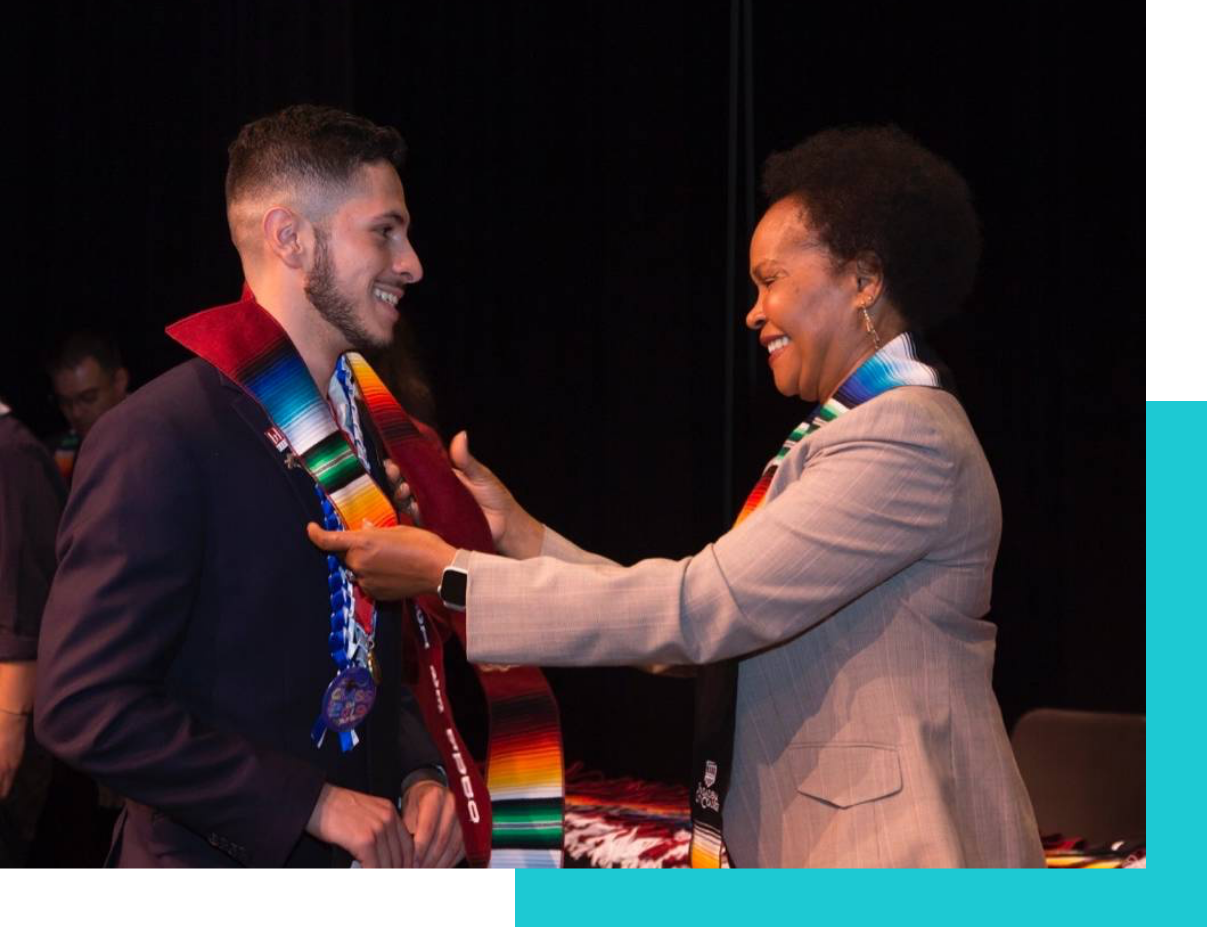Putting Career First and Expanding the Network of Care in PCC’s Pathway to Completion for Hispanic Students
Dates: 2020 - 2025
Award Amount: $3 million ($600,000/yr)
The Pathways to Completion II grant intentionally centers Latina/o/x and Chicana/o/x students and their intersectional experiences in the design and delivery of student Success Centers and a Career-First curriculum.
The grant will:
- center around a Network of Care including counselors, coaches, tutoring, faculty, support centers and more.
- create Career Communities that are hubs of exploration and empowerment for Latina/o/x and Chicana/o/x students and their peers
- encourage students to stay on path to completion through focused support
Project Goals
- Academic Programs: Develop a multi-faceted approach to career exploration that introduces early and reinforces often, offers robust internship opportunities contextualized for each career community, and career content that is embedded into curriculum.
- Institutional Management: Build and foster a multi-modal Network of Care, a student support model rooted in the fundamental belief that student support and advising is a shared responsibility and that support needs to be provided at both the micro and macro levels in order to truly impact the student experience.
- Fiscal Stability: Increase student outcomes and close equity gaps to ensure alignment with state-mandated performance-based funding focused on student equity, student success, and workforce outcomes.
Project Objectives
By Sept. 30, 2025, PCC will achieve the following project objectives:
- Persistence: Increase the fall-to-spring persistence rate by 10% (based on 2017-18 baseline: 71% all; 70% Hispanic)
- Excess Units: Decrease the average number of excess units at degree completion by 8 units (based on the 2017-18 baseline: average 91 units among all degree earners, as well as among Hispanic degree earners)
- Completion: Increase State-defined Scorecard completion rate by 5% and close equity gap (based on 2016-17 baseline: 56% all; 46% Hispanic)
- Field of Study: Increase the number of PCC students who are employed in their field of study by 5% (based on the 2018-19 baseline of 72.5%: 70% for Hispanic students)
- Living Wage: Increase the percentage of PCC students who earn a livable wage within 1 year of completion by 6% (based on the 2017-18 baseline of 41%: 35% for Hispanic students)1
Personnel
- Project Director – Dean Stephanie Flemming
- Career First Curriculum Faculty Lead – Dr. Silvia Toscano
- Faculty logistical support – Prof. John Q. Davis
- Outside consultant – Heidi Coronado
Given the emphasis on the label “Hispanic” throughout the grant narrative, it has been important to the faculty lead and collaborators to consistently call it into question. Viewers of this page should know that neither the faculty lead nor the collaborators played any role in authoring the grant or contributing to the narrative that resulted in over three million dollars in funding over the five-year duration of the grant (2020-2025). Who is this grant intended to serve, exactly? How are the parameters defined? Do the students themselves have any say in any of these goals? These inquiries have been seriously and thoroughly considered by the faculty lead and her collaborators.
Chicano Studies professor, José Maldonado, clarifies in his article, “The Roots of Identity & Denial,” that in 1970, under the Nixon administration, the U.S. Census was the first to include the category of “Hispanic.” This is important to point out because while “Hispanic” has “become the official government designation, it has received mixed sentiments from the community it is supposed to identify” (Maldonado, 2021). Other categories have emerged to quantify and identify a large, historically and geographically complex population in the U.S.A. However, it is important to note that labels, such as “Hispanic” and the more recent “Latino, Latina, Latinx, Latine” oftentimes serve to de-emphasize the Indigenous origins of our largest and continuously most misrepresented and underserved student populations, those of Mexican and Central American descent.
Chicano Studies emerged as part of the larger social (and student movements) of the late 1960s in the United States as a means to ensure that educational institutions would no longer ignore or demean the presence of the brown community (also known as La Raza—or simply—the people) of working class and barrio origins. Many are unaware that the creation and institutionalization of EOPS (Extended Opportunities and Services Programs) was highly influenced by El Plan de Santa Bárbara (1969)—a primary document that emerged during the Chicano Movement. Chicano, as a label, is one that has been, historically, self-ascribed by mostly (but not exclusively) people of Mexican ancestry. Self-naming or identifying oneself on one’s own terms aligns with the principles of autonomy and self-determination characteristic of a politically and critically conscious self-awareness that is communal at its core.
From this trajectory, an investigation conducted by the Office of Institutional Effectiveness at PCC called the “Expanded Ancestry Cluster Analysis” is of particular interest. It was published in December 2021 and revised in December 2022. Viewers are encouraged to closely examine the interactive findings: Expanded Ancestry: Finding Clusters in Ancestry Data. As such, the data helps visually illustrate that the majority of “Hispanic” students at PCC actually self-identify as Mexican and are of Mexican or Central American ancestry. It follows that if the very large majority of “Hispanic” students actually self-identify as Mexican or Central American, how can the grant best serve their interests and needs?
The work shared on this webpage has carefully considered the implications of the “Expanded Ancestry Cluster Analysis”—at an institutional level, especially with regard to student programming and curriculum design (intended for professional development meant to enhance “serving-ness”).
Pasadena City College qualifies as a Hispanic Serving Institution (HSI) because over 50% of its student population falls under the category of “Hispanic,” the majority of whom are of Mexican and Central American origin. The Title V Grants at PCC, specifically the Putting Career First and Expanding the Network of Care in PCC’s Pathway to Completion for Hispanic Students team, recognizes the problematic nature of this and other categorizations and labels for a sector of the student population who has (or chooses to center) Indigenous origins from both the northern and the southern regions of the Americas. Indigeneity is an important focal point to highlight, especially given the recent dissemination of the 2020 Census. People were informed that they were required, by law, to submit their responses either electronically or by mail. According to the 2020 Census, if one is to identify as Mexican, Mexican American, and/or Chicano—or for that matter Puerto Rican, Cuban, Salvadoran, Dominican, Colombian, Guatemalan, Spaniard, Ecuadorian, etc.—one must, also, by default, agree to Hispanic or Latin origins.
The inherent “logic” of the question disallows for an affirmation of Indigenous origins—origins that are dominant and existed before the arrival and invasion of the Spanish and their European/Latin ideologies, languages, and religions to the ancestral lands from where so many of our students and their families have emerged. Additionally, this Indigenous history existed long before the U.S. federal government developed standards provided by the U.S. Office of Management and Budget for collecting data on race and “Hispanic” origin, an origin that privileges and centers Euro-colonial origin and identity. To serve our students, we must respect, not impose, their origins or identity, especially those that have been a focus of erasure and misrepresentation for centuries whereby the many thousands of years represented by their Indigenous history, knowledge, and cultures has been and continues to be disappeared. As advocates of equity outcomes and social justice in education, it is important that we commit to continued learning, unlearning, and relearning to be of true service to our largest and most diverse student population.
With respect to the 7 generations before us and after us.
This statement was authored by Dr. Silvia Toscano in collaboration with Dr. Roberto “Cintli” Rodríguez in May 2021. With reverence, viewers of this page are encouraged to explore the life and legacy of the late Dr. Cintli. The PCC campus community should feel honored that the spirit and essence of such a distinguished author, scholar, and activist had an influence on the intentions, visions, and manifestations of the various projects created over the duration of the grant.
Below is a comprehensive timeline of one strand of the grant under the leadership and management of Dr. Silvia Toscano and her direct collaborators. Her efforts as a woman of color faculty member are important to understand, see, interact with, question, and support. This page serves as a way to document and archive contributions that are often unseen, unrecognized, and misunderstood within academic institutions.
- Application process begins for Career First Curriculum Faculty Lead, reassigned time position under the leadership of Dr. Isela Ocegueda, Dean of Academic Affairs
- Dr. Silvia Toscano selected as the Career First Curriculum Faculty Lead with duties to begin Spring 2021
Under the leadership Dr. Ocegueda, standing meetings scheduled for Title V Grants, Abriendo Caminos and Pathways to Completion. With a focus on curriculum redesign and career first curriculum, these two components both addressed interventions and developments in curriculum and the classroom.
Dr. Ocegueda sought to overlap efforts as much as possible in order to:
- Combine expertise and efforts to address equity, academic and liberatory outcomes, as well as career exploration/ preparation
- Acknowledge that equity, academic and liberatory outcomes as well as career exploration/preparation are integrated in the broader aspiration of life success and not seen as distinct aspects
- Collaborate with faculty through this integrated approach so that they understand it as integrated and can benefit from it
During this time, PCC, as many other educational institutions were directly impacted by the Covid-19 global pandemic and were operating primarily online. The first student programming event was designed as a lecture, discussion, and celebration in honor of Indigenous Peoples' Day on Tuesday, October 12, 2021, through Zoom.
The event prompted the inquiry of how to integrate culturally relevant and responsive strategies for Career Exploration & Readiness in our classes. It encouraged emphasis on the historical context that affirms: “Brown, Indigenous bodies have been and continue to be a major source of labor power sustaining racial capitalism in the U.S. Southwest, and by extension, Mexico” (Zavala, 2021).
Participants had three different options to choose from:
- Keynote by Dr. Miguel Zavala (CSU, Los Angeles), “Colonial Dispossession & Subjugation as Contexts for Understanding Chicanx-Mexican Labor” 12-1 pm
- Discussion by Chicano-Indigenous educators, Professor José Maldonado (L.A. Mission College), Professor Santiago Andrés Garcia (Rio Hondo College), & Claudia Itzel Márquez (licensed Art Therapist) on implementing critically conscious, culturally relevant Career Exploration & Readiness pedagogies 1-2 pm
- Celebration of the embodied experience of identifying as Brown and Indigenous through creative expressions & contemplative practices with Professor Tony Sandoval (CSU, Northridge). Dr. Cueponcaxochitl D. Moreno Sandoval (CSU, Stanislaus), and Dr. Heidi Coronado (Cal Lutheran University 2:30-4pm
Dean of Instructional Services, Stephanie Fleming. takes on the role of overseeing the Pathways to Completion Grant.
A series of online events were carefully designed to provide consistent opportunities for both students and faculty to gain access to Career Exploration & Readiness in culturally relevant and responsive ways, centering equity and social justice.
Pathways to Completion: Mentor/ Alumni Series focused on Career Exploration & Readiness
In this first series, each virtual presentation session connected a faculty member/expert in a particular field and a PCC alumnus. The goals of the series sought to:
- Center culturally relevant and responsive Career Readiness and Exploration programming for students.
- Honor the lived experiences and voices from Chicano/a/x and Latino/a/x communities
- Highlight PCC Alumni and their efforts in social justice projects and scholarship
- Provide access to anti-racist professional development opportunities from scholar-educator-activists committed to humanizing pedagogies and social-justice action.
Social Justice for Communications/Journalism Majors Plática
February 8, 2022
The first session was a heart-to-heart discussion (or plática) featuring:
- Dr. Roberto “Cintli” Rodriguez
Journalist, Author, Professor-Scholar-Activist
University of Arizona (Mexican American Studies) - Tania Pacheco Gastelum
Translator, Co-Editor, Author - Ricardo Garcia Puentes
PCC Alumnus
CSULA History Major, Chicanx/Latinx Minor
Published Author
English Majors and Careers with an Equity Lens
February 15, 2022
This second session included a discussion of Career Readiness & Exploration for Raza students from a Raza-studies perspective—with an emphasis in the field of English Composition. The panel presenters included:
- Professor María Figueroa
English Department Chair, MiraCosta College
English Composition, Literature, & Humanities Faculty
Puente English Professor
Chicana Mother Scholar Artist - Albert Palma
PCC Alumni
CSU, Northridge M.A. candidate in Rhetoric & Composition
CSULA, B.A. English Lit.
QTBIPOC Middle School English Teacher
Career Explorations & Readiness Options for Undocumented Students
April 19, 2022
For this virtual event, important conversation related to Career Explorations & Readiness were prioritized, especially for (but certainly not limited to) Chicanx/Latinx student populations at PCC. The invited speakers shared from their firsthand, lived experiences as undocumented students who now work to serve this vital component of institutions of higher education.
Consejos y Apoyo: Beyond the Bachelor’s Degree — The ChicanX Graduate School Experience
March – April, 2022
This series of six virtual workshops sought to honor the voices and lived experiences of ChicanX graduate students and to provide a safe space for undergraduates to build community and ask questions about earning a bachelor’s degree and beyond! Topics included:
- Aligning with Research Interests
- Applying to Graduate School
- Queer Students FYE
- Master’s Degree vs. PhD
- Research Projects
- Realities of the Job Market
Chicana$ Making $ Move$
May 9, 2022
This last session of spring 2022 was designed to honor the entrepreneurial spirit of Chicana independent and small business owners. Itzpapalotl of Children of Venus and Dr. Priscilla Ortiz of Tree of Life Botanicals highlighted their journeys in navigating an autonomous lifestyle focused on holistic wellness, balance, and authenticity.
Sabbatical Year for Dr. Silvia Toscano
Module Edits by Professor John Davis
Sabbatical Year for Dr. Toscano
Module Edits by Professor John Davis
The Career Readiness & Explorations Modules were carefully conceptualized, curated, and edited by Dr. Silvia Toscano, Dr. Heidi Coronado, & Professor John Davis respectively. They represent a unique approach to the topic of Career Readiness & Exploration and offer culturally relevant, responsive, & competent curriculum options. The Canvas modules promote equity by being (ZCT) zero cost textbook as well as accessible/ applicable to all disciplines. The collaborators seek to create a sustainable repository of the modules for continued, ongoing professional development.
Personalization and customization of the modules is recommended once faculty members have participated in professional development training provided by Dr. Silvia Toscano and Dr. Heidi Coronado, as both have advanced education degrees and teaching experience in Chicano/Latino Studies, Ethnic Studies, and Humanizing Pedagogies of Liberation as well as Holistic Wellness.
Dr. Toscano piloted the first iteration of the edited Career Readiness & Exploration Modules for a 16-week, asynchronous English C1000 (formerly English 1A) course during spring semester 2023. The titles of the modules were:
- Being First-Gen & Navigating Relevant Support for College & Career Readiness
- Empowering the First-Gen Search for a Meaningful Career through Community Cultural Wealth
- Considering the Intersections: Identity & Career Explorations
- Honoring Resiliency in Pursuit of a Fulfilling Career Path
- Values, Ethics, & Authentic Interests for Career Readiness & Development
A series of Chicano Resource Fairs were designed to center a decolonizing Chicano Studies Framework and sought to ensure that the grant funds were used to:
- Advocate for student programming that is identity affirming in ways that honor ancestral knowledges and lived experiences
- Center a race consciousness that is critical of colonizing labels and the epistemic violence they can cause
- Promote cultural sustainability, longevity, and authenticity rooted in historical moments/movements of resiliency, agency, and autonomy
Each Chicano Resource Fair provided students, faculty, administrators, and community members the opportunity to:
- Explore intersectional identity formations and choice points for personal expression
- Clarify values and interests that honor ancestral knowledge systems
- Prioritize first-generation lived experiences and challenges
- Examine resiliency development
Each of the Chicano Resource Fairs consisted of a panel discussion by Chicano/a/x professionals. Each panel was carefully moderated to ensure relevancy with regard to career exploration, readiness, and preparation using a decolonizing Chicano Studies Framework. The fairs also included opportunities for students to access resources on and off campus and to speak one-on-one to local employers and professionals when possible. Culturally relevant and healthy food options and refreshments were provided to those attending. The Chicano Resource Fairs were free of charge and accessible to all without prior registration. Collaborations with other career-focused campus constituents were prioritized.
Chicano Resource Fair #1: Community Wellness
The first event was centered on those with an interest in exploring a career path with a focus on health and wellness from a holistic, socially just and culturally relevant perspective. Outreach for this event included faculty in Ethnic Studies as well as those affiliated with CORE. Respected Indigenous Elders, Maestra Grace Alvarez Sesma (Yaqui/Mexicana) and Maestro Samuelin Martinez were the invited speakers at this historic gathering at PCC.
The event was historic insofar that it included intercultural exchanges among the invited speakers and local members of the Gabrieleño Band of Mission Indians Kizh Nation. Both Jeremy Gonzales, community activist, and his cousin, U.S. Army veteran, Albert John Acuña Jr., were not only in attendance but included as integral to the opening blessing to the event and overall series. To learn more about how to align with the priorities of these First Nation activists, please visit Controversial Santa Monica Mural Could be Changed (spectrumnews1.com)
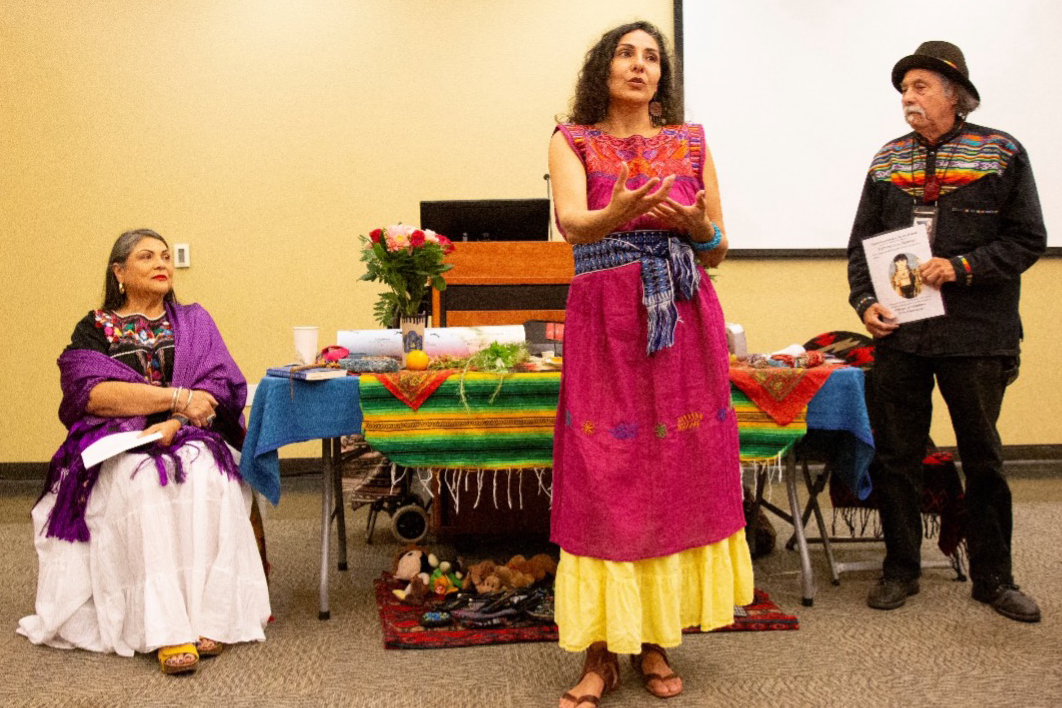
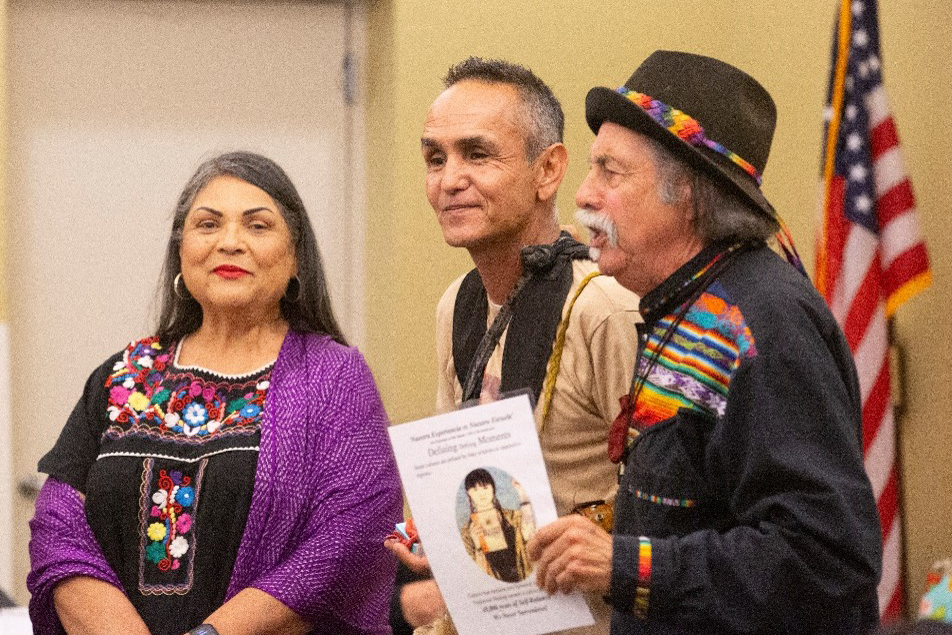
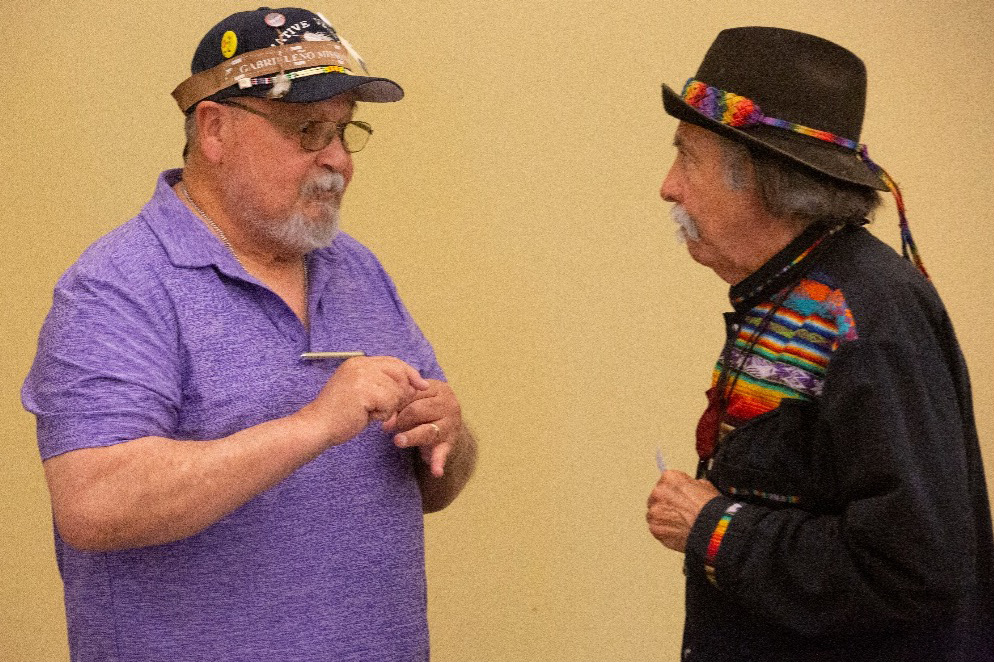
Chicano Resource Fair #2: Community Activism
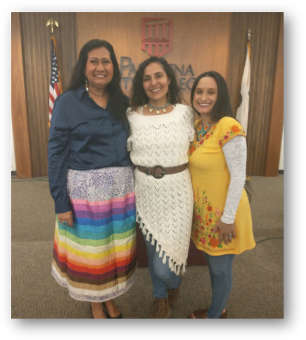 The second event focused on those with an interest in Paralegal Studies, Political
Science, Sociology, and Community Organizing.
The second event focused on those with an interest in Paralegal Studies, Political
Science, Sociology, and Community Organizing.
Our guest speakers were amazing women, mothers, and leaders in their respective communities. Lupe Lopez is a Legal Documents Assistant (LDA) and has her own business in Orange County 1212 Documents (American Indian Law). Monique Orozco earned her Master’s of Legal Studies in Indigenous People’s Law in 2018 and successfully completed her 1L year at The Colleges of Law, Ventura, CA.
Chicano Resource Fair #3: Community Empowerment
The third event focused on students and community members with an interest in Hospitality & Business, Indigenous Culinary Arts and Veganism, Family Wellness, and Humanizing Birth Practices. Efforts were made to outreach to the Family Resource centers on campus, including that serve soon-to-be parents. The invited presenters, Dr. Claudia Serrato and restaurant owner of Malinalli Superfoods and doula, Jenny Silva, are powerful women and mothers who are also business owners and entrepreneurs. They shared their personal and career narratives highlighting intersectionality as well as how they have responded to the call of centering ancestral & Indigenous identities in creative ways. The storytelling was truly awe-inspiring.
This event was also co-sponsored by the Chicano Studies/English SSF(Student Services Fund), which assisted in providing the audience with an interactive Danza Azteca intermission. We are so grateful to the drummers and danzantes, especially Ruben Macias of Telpochcalli Coyolxauhqui.
Chicano Resource Fair #4: Community Education
The final and culminating event of the series sought to engage those interested in pursuing fields of study related to Journalism, Geography (GIS), Political Science, and Social Justice Education. It was a successful collaboration among various constituents on campus, including the Hixon Teacher Preparation Program at PCC, the Division of Institutional Equity, Diversity & Justice, The Chicano Studies/English SSF (Student Services Fund).
Jeremy Gonzalez, returned to our campus to offer words of wisdom related to both Land and Life Acknowledgements. Sisters of the ONE DRUM, an inter-tribal women’s drum circle, provided a constant pulse for the event focused on unity and empowerment.
Marcos Aguilar provided a provocative presentation, “Teaching and Learning Before Columbus: Indigenous Intelligence Beyond Fractured Futurity.“ Aguilar is the co-founder and Executive Director of Anawakalmekak, public charter school of the Los Angeles Unified School District dedicated to student academic excellence, Native wisdom, and appreciation of the cultural and intellectual heritage of Indigenous Peoples and the promotion of positive social awareness. It should be noted that Marcos Aguilar was also a protestor in 1993 during the 14-day hunger strike at UCLA to demand for the establishment of a Chicano/a Studies Department. The protest was successful and resulted in the creation of the César E. Chávez Center for Interdisciplinary Instruction in Chicana and Chicano Studies.
Leticia Rojas, coordinator of the Hixon Teacher Prep Program at PCC, shared her career narrative and about the pathways for potential teachers interested in TK-12 and beyond. Audience members asked problem-posing questions and several showed interest in the Hixon Teacher Prep Program at PCC.
Ivette "Xochiyotl" Boyzo was our Keynote Speaker. She spoke extensively about her work with La Raza Database (CSUSB). This database is an imperative resource for anyone vested in anti-racist curriculum and programming. The Raza Killings Database team has examined the undercounting of deaths of brown and black people killed in the presence of or by law enforcement. The database highlights what is possible with collaboration and an openness to interdisciplinary research. It provides an executive summary, analysis, data tables, narrative testimonials/essays, music album, and a GIS interactive map, "Geography of Death Pursued or in Police Custody 2000-2020."
Although organizing the Chicano Resource Fairs was a challenging task, the efforts proved to be rewarding and successful. The focus on Career Exploration & Readiness from a decolonizing Chicano Studies Framework helped engage Chicano/a/x and Latino/a/x students as well as other underrepresented student populations across campus.
Chicano Resource Fairs Student & Community Testimonials
"These conferences are a perfect supplement to our California Literature course. While the essays and novels are powerful, th[ese] in person events are electrifying. It makes my soul soar. wished everyone I loved, loved themselves, enough to invest this time in themselves. I wished they could carve out time out of their busy days to learn something about themselves the way I have" (H.H.).
"Cultural events like this are essential to the acknowledgement of Natives alive today and shine a light on the resilience these communities demonstrate, stating that they are still here and will not be forgotten as long as these ancestral teachings are being shared and taught" (A.V.).
"I’m so grateful I prioritized making it to this event, because I was profoundly inspired by what the speakers all shared. The vulnerability they so willingly offered was so special and admirable, and I value it dearly. As a white person, I want to be as educated as I can; but coming to understand just how much I don’t know can be uncomfortable. As Kimmerer says in the article, Weaving Traditional Ecological Knowledge into Biological Education: A Call to Action, ‘Stepping outside our own cultural and educational framework is exceedingly difficult—difficult, but worthwhile’" (Kimmerer 437 qtd. in P.G.)
"In conclusion to this event, I've had a great reflection on the way I have thought about myself. Especially when it comes to marking myself to the world. Just like the speaker started from nothing, she gained everything. Branding herself, promoting herself, and creating a life where she felt comfortable and proud of" (T.V.).
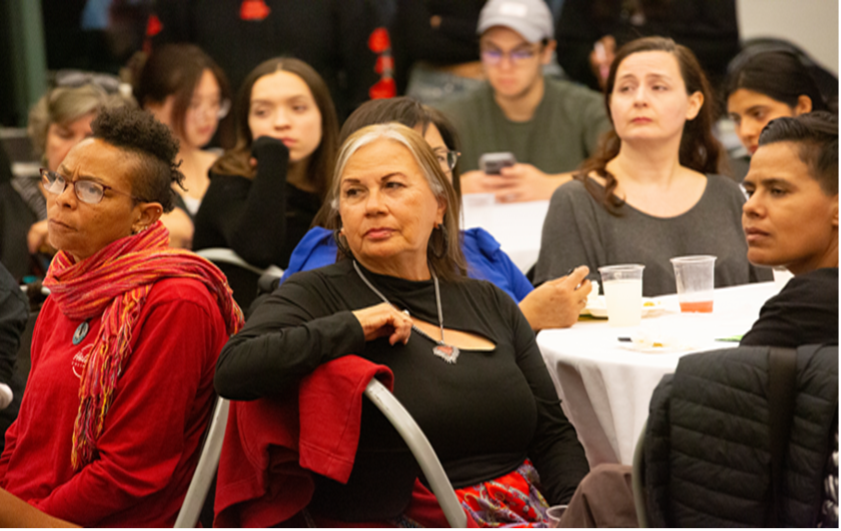
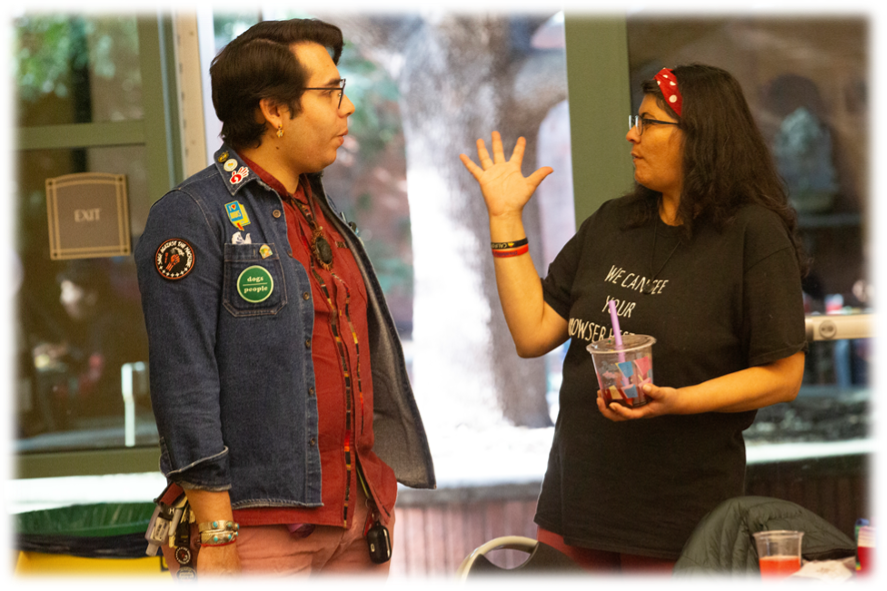
Chicano Resource Fairs Vendors & Community Support
- Malinalli Superfoods East L.A.
- Claudia Serrato, LLC
Food. Anthropology. Indigeneity. Decolonization - Los Angeles Indigenous Peoples' Alliance (LAIPA)
- Telpochcalli Coyolxauqhi Danzantes
- XiCali Products
- Children of Venus
- Professor Tezozomoc (L.A. Pierce College)
- Tata G Conscious Culture Community Foundation
- Rosa Rosales Fertile Hands
- Artesanias Omeyocann @omeyocann_arte_sano
- Sisters of the ONE DRUM
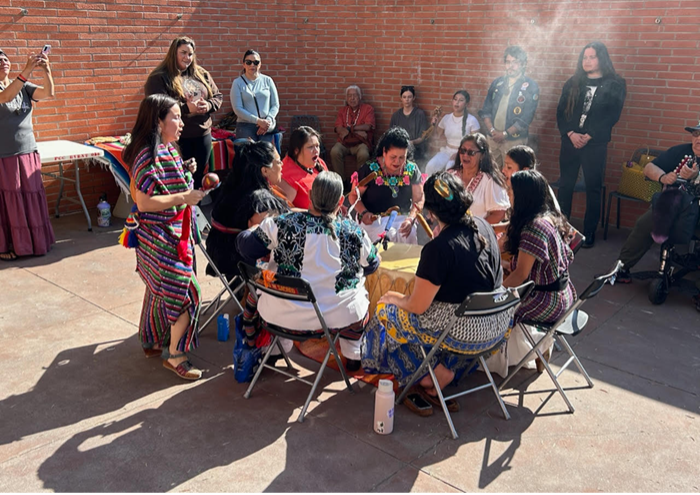
Dr. Toscano is piloting the second iteration of the edited Career Readiness & Exploration Modules for two, 16-week, hybrid English C1000 (formerly English 1A) courses and one 12-week asynchronous English C1000 (formerly English 1A) course during fall 2024. The titles of the modules are:
- Being First-Gen & Navigating Relevant Support for College & Career Readiness
- Empowering the First-Gen Search for a Meaningful Career through Community Cultural Wealth
- Considering the Intersections: Identity & Career Explorations
- Honoring Resiliency in Pursuit of a Fulfilling Career Path
- Values, Ethics, & Authentic Interests for Career Readiness & Development
Using Dance Funds of Knowledge for Career Advocacy through Embodied, Decolonial Praxis
What does it mean to embody ancestral wisdom in ways that are empowering within contemporary times? How does embodying ancestral wisdom translate into a personal aesthetic that exudes self-confidence and self-love? Former PCC student, danzante, and choreographer, Dr. Alicia Mosely, will weave these themes together during 5 interactive, in-person workshops that will help students and community members prepare for job talks, interviews, and networking situations. More details and information coming soon!
Dr. Alicia Moseley
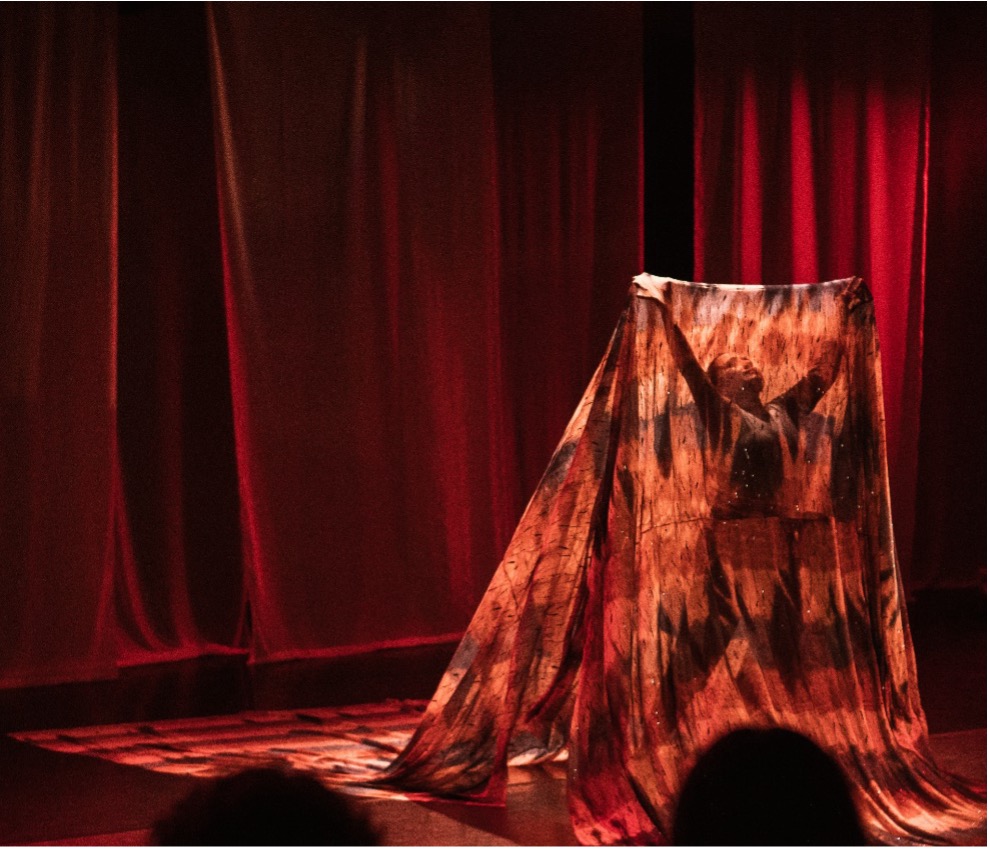 Alicia Moseley is an indigenous woman from Ecuador. Alicia decolonized her body and
mind with the teachings of her indigenous grandfather. During her decolonization process,
she understood her lineage to Andean danzantes. Alicia has over three decades of dance
experience. She is a dancer, choreographer, and costume designer. Alicia’s dance background
includes Andean dance, Modern, Jazz, Butoh, Cumbia, Salsa, Merengue, Bachata, Haitian
dance, and Ballet. Her passion for dance is based on the Andean cosmovision which
indicates all human beings dance in the mother’s belly. Alicia believes that dance
must be an integral part of human education because dance helps with the cognitive
development of the brain. Alicia’s dance experience led her to observe that dance
assists with emotional maturity, social awareness, and academic achievements. For
Alicia, dance is about collaboration which implies a self-understanding of space,
movement, and human interaction. Alicia is a PCC alumna, has a BA in Latin American
Studies with a Dance and Theater minor and a Master’s degree in Latin American Studies.
Currently, she is earning an EdD in Leadership and Education. Her dissertation focuses
on dance as a form of decoloniality.
Alicia Moseley is an indigenous woman from Ecuador. Alicia decolonized her body and
mind with the teachings of her indigenous grandfather. During her decolonization process,
she understood her lineage to Andean danzantes. Alicia has over three decades of dance
experience. She is a dancer, choreographer, and costume designer. Alicia’s dance background
includes Andean dance, Modern, Jazz, Butoh, Cumbia, Salsa, Merengue, Bachata, Haitian
dance, and Ballet. Her passion for dance is based on the Andean cosmovision which
indicates all human beings dance in the mother’s belly. Alicia believes that dance
must be an integral part of human education because dance helps with the cognitive
development of the brain. Alicia’s dance experience led her to observe that dance
assists with emotional maturity, social awareness, and academic achievements. For
Alicia, dance is about collaboration which implies a self-understanding of space,
movement, and human interaction. Alicia is a PCC alumna, has a BA in Latin American
Studies with a Dance and Theater minor and a Master’s degree in Latin American Studies.
Currently, she is earning an EdD in Leadership and Education. Her dissertation focuses
on dance as a form of decoloniality.
More information about Alicia’s Danza philosophy and her works, can be found at: Danza, An Ancestral Non-Verbal Language
4-Day Winter Intersession Retreat
Professional development training, during the 4-Day Retreat, will familiarize faculty members with the content of each of the five Canvas modules, which include the following topics and skills:
- Defining first-generation, understanding the characteristics of first-generation college students, identifying relevant support for this diverse population with regard to college & career readiness
- Gaining exposure and opportunities to analyze Dr. Tara J. Yosso’s (2005) concept of Community Cultural Wealth as a tool for empowerment within the first-generation search for meaningful career options
- Defining Intersectionality stemming from Kimberlé Crenshaw’s (1989) theoretical discourse and exploring the applicability of it within the Chicano/Latino experience through Cindy Cruz’ (2004) conceptualization of an Epistemology of a Brown Body and its role in identity and career explorations through deep introspection, self-reflection, and self-study
- Honoring resiliency in pursuit of a fulfilling career path, which requires an in-depth examination of the topic of intergenerational historical trauma by Chicano authors (Gonzales & Rodriguez, 2004-2005) who engage with the pain and emotion (Urrieta, 2003) of colonial subjugation (Zavala, 2021)
- Prioritizing values, ethics, and authentic interests through principles of embodiment, self-concept, and self-confidence originating with acknowledgement of ancestral roots and pre-Hispanic origin stories

